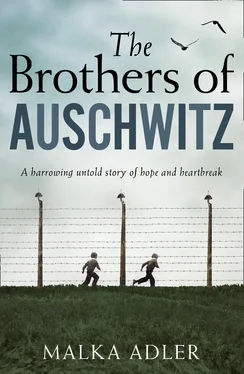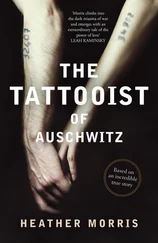Our family was given a space the size of a living-room sofa. We slept on planks and wet blankets. We ate a bowl of potato soup after waiting in line for hours. One bowl a day. We were still hungry. We saw peddlers walking around the pit. They made signs at us with their hands. Signs of the cross, signs of slitting throats as if they held a knife in their hands. They grinned toothlessly, hee hee hee. I could have pummeled them with my fists. Mother spoke to me wordlessly. I pummeled myself with my fists until my leg was numb. People with important faces and wet jackets walked among us. They were known as the Judenräte .
They promised, just a matter of days and you’ll be in the east. They spoke of many work places.
We waited for the train that would take us east to many work places. The train didn’t come. People became impatient, at first a little, then increasingly so. After three days they yelled at one another for no reason. If they unintentionally touched an elbow in the line for soup or the tap, they yelled. They argued about where to place their head or feet when going to sleep. Or why they farted right into a baby’s face.
Poor little thing, he choked, a little consideration, Grandpa. They argued about rumors. Yelled, yelled, yelled, a day later, they repeated the rumors and reported new ones. There were no rumors about death, no words about death; about liberation, yes. Many words about imminent or distant liberation. We were ignorant about the news they reported, we just heard and waited. Waited almost a month.
Finally a special cattle train arrived on the track.
We were sure it was a mistake. Soldiers pushed us into the cars. They forcefully pushed entire families. Entire villages. Towns. Cities. I understood. The Hungarians wanted to cleanse the world of Jews. Didn’t want to breathe in a world a Jew had passed through. Wanted to look far into the future, ah, no Jews. None. Clean sky, sun and moon, too.
The journey by train was a nightmare.
We traveled three days without food or water. We traveled in a car with a tin bucket for the needs of a small town. The infant in the arms of the woman with cracked glasses cried ceaselessly. A yellow thread oozed from his ear. My mother cut a strip of fabric from a sheet and tied it around his head. Like mumps. The infant’s crying increased. The woman tried to give him her nipple, but he didn’t want it. He only wanted to cry. After two days the crying stopped and the woman began. At first she wept alone, then another five or six people alongside her began to weep, like a choir. Finally, she covered the infant’s face with a sheet. Refused to give him to the tall man standing beside her. She had a brown spatter on her glasses. I dug my nails into my leg, dug and dug, until there was a small hole.
Dov said, he was saved, the baby died in his mother’s arms. We will die alone.
We stood in line on the platforms at Auschwitz.
Trains were standing the length of the track. Like an enormous, long-tailed serpent.
Babies flew into the air like birds. Pregnant women were thrown onto a truck. One woman’s belly exploded mid-air, everything scattering as if there was a watermelon there, not a baby. Old people who couldn’t walk were smeared on the floor. Whole villages stood on the platform without room to move. In the air, a column of smoke and the sharp smell of burned chickens. That’s what I remember.
First they separated the women from the men.
I never saw mother or Sarah again.
We passed by an officer with a pleasant face, as if he liked us, felt concern. As if he cared about us. With his finger, he signaled, right, left, right, left. We didn’t know his finger was long enough to reach the sky. Then they asked about professions. Dov jumped first. We didn’t have time to part from each other.
The soldiers shouted builders, are there any builders? Avrum and I walked forward together. Father remained to choose another profession. I never saw father again.
They took us to a building where we were to strip.
A long, never-ending line. As if they were handing out candies there. And then they told us quickly, strip quickly. Naked women ran in the direction of a large iron door. The door constantly opened. Naked women were swallowed up into the black opening of the door. Like the large mouth of the sea. Men and boys ran the other side. Bearded rabbis screamed Shema Israel, Shema Israel.
Avrum and I stood trembling opposite the building that had swallowed the most people.
The building had a black door and another one just the same. My brother and I didn’t know where we should run. Naked and confused we ran from one side to the other, treading on legs, pushing with our hands. Around me I saw people spinning with their hands above their heads, beating their chests, pulling their hair from their heads, their genitals. I saw people weeping to their God, telling him, God, hear me, give me a sign, where is the Messiah, Master of the Universe. The was a sound there like a low hummmm, heavy as a snowstorm. Hummm. Hummm.
I called to my brother until my throat was hoarse.
I called, Avrum, Avrum, which door should we run to, Avrum, answer me.
Avrum caught my hand. Avrum sobbed, here, no, there, no, no, Avrum, what do we do, where, where, the first door, no, no, the second, Icho what are you doing, Icho listen to me, wait, liiiiisten. We were inside.
We were inside a huge hall with benches. A huge hall with barbers who shaved hair. Tirelessly, they shaved and shaved. Then they took us to the showers. And then, phishsh. Water. I called, Avrum, it’s water, water, we’re alive, Avrum, we’re still together, Avrum, we’ve been lucky, Avrum. I sobbed during the entire shower.
I am Dov: The State of Israel gave me the name Arieh-Dov, Dov for short.
The Nazis gave me the number A-4092.
The goyim gave me the name Bernard.
My Jewish people gave me the name Leiber.
I was sure they were taking us to die.
Father thought they were sending us to work in distant factories. I thought about death. My death had a shiny red color. Red like the blood oozing from the ear of the man standing beside me in the train to Auschwitz. This man had refused to board the train and the blood refused to stop streaming for three days, perhaps because of the crowdedness and the pressure, everyone was pressed against everyone else. We were like fish in a barrel stinking of fresh death, a new smell that came into my life and didn’t leave me for a long time.
The train to Auschwitz stopped.
The car door opened quite suddenly. Torches like projectors exploded in our eyes. The loudspeaker announced, quickly, quickly, schnell, schnell. Leave belongings on the train. We heard irritability in a voice that was sharp and loud, as if there was nothing but a voice there, no human being, just a voice, schnell, schnell.
On the platforms were soldiers with guns and voices like loudspeakers. Get down, quickly, quickly. They yelled as if they had a loudspeaker installed in their throats. To the side stood piles of striped pajamas, a head and arms sticking out of them. I saw nothing else of them. They stood to one side with bowed and shaven heads. They were more frightening than the orderly soldiers. They looked ill and suffering. The soldiers didn’t. The orchestra was also healthy. They played cheerful marches suitable for a victory parade.
Dogs on leashes barked wildly. Dogs with sharp teeth and runny noses, their hackles up like nails. Soldiers pushed an old bearded grandfather who didn’t understand, who said, excuse me, sir, to the commander, what should … Thwack. The old man fell. Soldiers beat up other frail old people. Smashed shoulders, belly, back. They didn’t let them die on the spot, they left them to sob. And they sobbed with pain. Others wept in worry or because of the orchestra. There was a good orchestra at Auschwitz. I could immediately hear it was good. I almost wept for the beauty of it, but the large pile of striped pajamas stayed in my mind, and I didn’t cry.
Читать дальше












